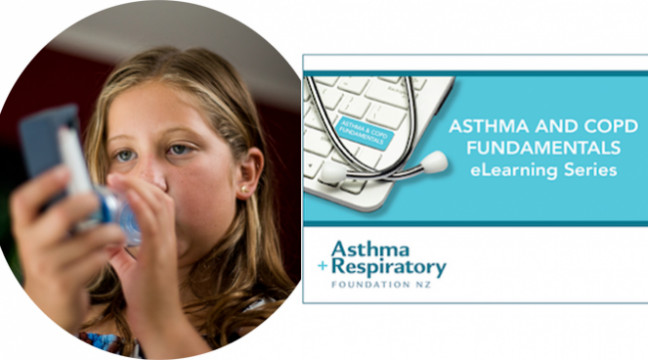Asthma in adults for healthcare providers
Key points about asthma in adults
- This page contains information about asthma in adults for healthcare providers.
- Find information on asthma statistics, research, clinical pathways and guidelines.

(Ako Hiringa, NZ, 2022)
Medicated asthma prevalence showed no significant change during the study period in adults or children. The hospitalisation rate for asthma peaked in 2009 at 218 per 100,000 people, and overall declined slightly over the study period. Asthma mortality rates, however, which appeared to be declining in the previous report, have returned to previous higher levels, peaking at 2.0 deaths per 100,000 in 2014.
Risks for asthma were similar across measures. Prevalence, hospitalisation and mortality were all significantly higher for both Māori and Pacific peoples, and in more socioeconomically deprived neighbourhoods. In children, all asthma measures were higher for boys, whereas for adults, asthma measured higher for women.
Socio-economic differences in asthma hospitalisation saw rates 2.7 times higher in the most deprived NZDep2013 quintile 9-10, and 1.9 times higher in NZDep2013 quintile 7-8, compared to the wealthiest NZDep2013 quintile. These differences were similar to mortality differences. Asthma prevalence showed a deprivation gradient for female children, but not for female adults, and not for males.
2017 asthma hospitalisation rates were lower than the national average in all South Island DHBs except West Coast, and higher than the national average in all North Island DHBs except Auckland, Waitematā, MidCentral and Capital and Coast; 2015 mortality rates were highest in the Tairawhiti and LakesDHBs.
Source: The impact of respiratory disease in New Zealand – 2018 update(external link)
Landmark clinical trials undertaken by the Medical Research Institute of New Zealand (MRINZ) found that the 2 in 1 inhaler containing preventer medicine budesonide and reliever medicine formoterol, was a far more effective treatment in controlling asthma than the traditional single reliever inhaler. Read more.(external link)
NZ Adolescent and Adult Asthma Guidelines 2020(external link) Asthma & Respiratory Foundation NZ, 2020
NZ asthma guidelines quick reference guide(external link) Asthma & Respiratory Foundation NZ, 2020
Telehealth clinical consultations – respiratory assessment(external link) ProCare, NZ, 2022
The pharmacological management of asthma in adolescents and adults has changed(external link) BPAC, NZ, 2020
Te ha ora – the breath of life – national respiratory strategy(external link) Asthma & Respiratory Foundation NZ, 2015
Managing adults with asthma in primary care – the four-stage consultation(external link) BPAC, NZ, 2017
Asthma medicines in adults(external link) BPAC, NZ, 2017
Asthma education in primary care(external link) BPAC, NZ, 2015
NICE asthma guideline(external link) NICE Clinical Pathways, UK, 2017
Asthma guidelines [PDF, 2.2 MB] British Thoracic Society, UK, 2017
Severe asthma toolkit(external link) Centre of Excellence in Severe Asthma, Australia, 2018
Severe asthma checklist(external link) Centre of Excellence in Severe Asthma, Australia, 2018
Respiratory research review issue 157 – asthma [PDF, 1.5 MB] Research Review NZ, 2019
Pharmac special authority forms for new generation biologic treatments
Benralizumab(external link) Pharmac, NZ
Mepolizumab(external link) Pharmac, NZ
Omalizumab(external link) Pharmac, NZ
See also the clinician's page on asthma in children for guidelines and other resources for children with asthma.
Webinar: Asthma – strategies to optimise patient self-management(external link) Teresa Chalecki, Respiratory Nurse Educator, CanBreathe
This presentation covers:
Poor asthma control is not necessarily due to patient non-adherence. Asthma is a chronic health condition and while guidelines and medications may assist in the diagnosis and treatment of asthma there are many other factors involved in achieving and sustaining good asthma control. Teresa will share some of the common issues that can lead to poor asthma control, some strategies to identify and overcome these and why ongoing
patient review and education is important.
You can watch the video, answer questions and claim hours with a certificate.
Let’s get ‘real’ about asthma management
In this webinar, Dr Andrew Corin shares pragmatic approaches to asthma management in an appropriate and patient-personalised way. He will discuss the value of real-world effectiveness data, and how this guides treatment selection for optimised patient outcomes.
(Goodfellow Unit Webinar, NZ, 2020)
Asthma & Respiratory Foundation NZ adult asthma guidelines - A quick reference guide by Professor Richard Beasley
(Research Review NZ, 2019)
Webinar: Asthma update by Dr Stuart Jones
(The Goodfellow Unit, NZ, 2018)
Webinar: An update on adult asthma
(Goodfellow Unit, NZ, 2017)
COPD and adult asthma seminar
For more videos of the same series, visit COPD and adult asthma (10 videos)(external link) Pharmac Seminar Series, NZ, 2015
Asthma & COPD Fundamentals Course(external link) Asthma & Respiratory Foundation NZ
This course aligns the latest research with specific information for the New Zealand context, such as recently funded medications, treating Māori and Pacific Peoples, and best practice health literacy.
The course aligns with the latest New Zealand asthma guidelines. It includes two half day workshops covering the key aspects of COPD and asthma pathophysiology, management and practice.

Credits: Healthify editorial team. Healthify is brought to you by Health Navigator Charitable Trust.
Page last updated:


